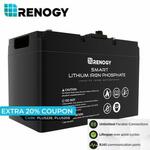Decent deal on well regarded Renogy 12v battery
Will Prowse tear down here https://www.youtube.com/watch?v=aahHWaV6Zdk&t=289s
Renogy Smart Lithium-Iron Phosphate Battery 12 Volt 100Ah
Auto-Balance: Connects multiple batteries in parallel safely without internal state non-uniformity issues.
Ultra-Safety: The battery management system (BMS) provides comprehensive protection to the battery and manages the charging/discharging process wisely.
Uncompromised Quality: State-of-the-art battery cells ensure a lifespan of more than 4000 cycles, 100A continuous discharge current, and a wide range of operation temperature.
Communication Port: The RJ45 communication ports enable data transmission to meet the needs of different usage scenarios.
Rated Capacity: 100Ah Insulation Resistance: 500V DC, ≥ 10 MΩ
Operating Charge Temperature: 32~131°F/ 0~55°C Maximum Continuous Charging Current: 50 A
Operating Discharge Temperature: -4~140°F/ -20~60°C Maximum Continuous Discharging Current: 100 A
Voltage Range: 10~14.8 V Communication Port: RJ45 (RS485 Protocol)
Nominal Voltage: 12.8V Storage Temperature: -13~149°F/ -25~65°C
Connection Method: Parallel Cycle Life: ≥4000 Cycles @ 80% DoD
Dimensions:11.4 x 6.8 x 7.4 inch / 289 x 172 x 187.5 mm Weight: 26 lbs. / 11.8 kg
Certifications: UN38.3, MSDS, UL1642 (Lithium Cell) Terminal Size: M8x1x20mm
Protection Rate: IP54
5-year material and workmanship warranty





Or … https://www.kogan.com/au/buy/toughland-rapidx-12v-100ah-lith…